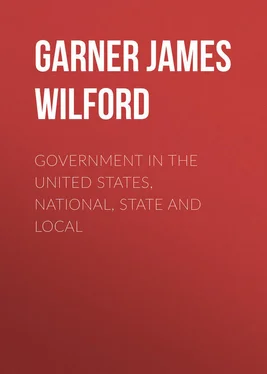James Garner - Government in the United States, National, State and Local
Здесь есть возможность читать онлайн «James Garner - Government in the United States, National, State and Local» — ознакомительный отрывок электронной книги совершенно бесплатно, а после прочтения отрывка купить полную версию. В некоторых случаях можно слушать аудио, скачать через торрент в формате fb2 и присутствует краткое содержание. Жанр: История, foreign_antique, foreign_prose, на английском языке. Описание произведения, (предисловие) а так же отзывы посетителей доступны на портале библиотеки ЛибКат.
- Название:Government in the United States, National, State and Local
- Автор:
- Жанр:
- Год:неизвестен
- ISBN:нет данных
- Рейтинг книги:5 / 5. Голосов: 1
-
Избранное:Добавить в избранное
- Отзывы:
-
Ваша оценка:
- 100
- 1
- 2
- 3
- 4
- 5
Government in the United States, National, State and Local: краткое содержание, описание и аннотация
Предлагаем к чтению аннотацию, описание, краткое содержание или предисловие (зависит от того, что написал сам автор книги «Government in the United States, National, State and Local»). Если вы не нашли необходимую информацию о книге — напишите в комментариях, мы постараемся отыскать её.
Government in the United States, National, State and Local — читать онлайн ознакомительный отрывок
Ниже представлен текст книги, разбитый по страницам. Система сохранения места последней прочитанной страницы, позволяет с удобством читать онлайн бесплатно книгу «Government in the United States, National, State and Local», без необходимости каждый раз заново искать на чём Вы остановились. Поставьте закладку, и сможете в любой момент перейти на страницу, на которой закончили чтение.
Интервал:
Закладка:
The New England Town.– The towns of New England are the oldest political communities in America, some of them being older in fact than the counties and states of which they are a part. Generally they vary from twenty to forty square miles in area, and are irregular in shape, being in this respect unlike the townships of many Western states, which were laid out in squares, each with an area of thirty-six square miles. In population they vary from a few hundred persons to more than 130,000 as is the case with New Haven, which, though an incorporated city, maintains a separate town organization.
Powers of Town Government.– The functions performed by the town governments are varied and numerous. The most important, however, are the support and management of public schools, the laying out and maintenance of roads, the construction of bridges, the care of the poor, and in the more populous towns, fire protection, health protection, the maintenance of police, lighting, paving of streets, establishment of parks, public libraries, etc. The towns also have power to enact ordinances of a police character, relating to such matters as bicycle riding on sidewalks, the running of animals at large, etc.
In addition to the management of the purely local affairs of the community, the town acts as the agent of the state government for carrying out certain state laws and policies. Thus it assesses and collects the state taxes, keeps records of vital statistics, enforces the health laws of the state, and acts for the state in various other matters. Finally, except in Massachusetts, the town is a district for choosing members of at least one branch of the legislature, and everywhere in New England it is a district for state and national elections. 1 1 Fairlie, "Local Government," p. 147.
The Town Meeting.– The central fact in the system of town government in New England is the town meeting, or assembly of the qualified voters of the town. The annual meeting is usually held in the early Spring (except in Connecticut, where it is generally held in October) and special meetings are called from time to time as necessity may require. All persons qualified as voters under the state laws are entitled to attend and take part in the proceedings of the meeting. Formerly non-attendance was punishable by a fine, but that is no longer resorted to; it being supposed that each voter's interest will be sufficient inducement to secure his presence. The attendance is larger in the towns of New England than in the states of the West where the town meeting exists, and it is larger in urban towns than in those of a rural character. Formal notice must be given of the time and place of the meeting, and this is done by a warrant issued by the selectmen, which specifies also the matters of business to be considered. This notice must be posted in conspicuous places a certain number of days before the meeting. No other matters than those mentioned in the warrant can be introduced or considered. The meetings are usually held in the town hall, though in the early history of New England they were frequently held in the church, which was thus a "meeting house" for civil as well as for church purposes.
The meeting is called to order by the town clerk, who reads the warrant, after which an organization is effected by the election of a presiding officer called a moderator, and business then proceeds in accordance with the customary rules of parliamentary law. The next order of business is the election of the town officers for the ensuing year. This done, appropriations are made for the payment of the public expenses of the town, and the other measures necessary for the government of the town are then discussed and adopted. The most interesting fact about the New England town meeting is the lively discussion which characterizes its proceedings. Any voter may introduce resolutions and express his opinion on any proposition before the assembly. One great advantage of this system of local government is its educative effect upon the citizens. It affords a means of keeping alive interest in public affairs and thus tends to develop a more intelligent citizenship. Important measures may be carefully discussed and criticized before the final vote is taken, and it is difficult to "railroad" or smuggle an objectionable measure through, as is sometimes done in the legislatures and city councils. Everything the officials and committees of the town have done is subject to be criticized, everything they are to do is subject to be regulated by the meeting. The final action of the meeting, therefore, is pretty apt to represent the real wishes of the people.
Conditions Unfavorable to Government by Town Meeting.– Various causes, however, are at work in some parts of New England to weaken the system of government by town meeting and to render it less suited to the modern conditions under which it must be operated. The growth of manufacturing industries in many of the towns has introduced a conflict of interests between factory owners and operators on the one hand, and farmers on the other. The result is occasional squabbles and controversies which are not favorable to government by mass meeting. The influx of foreigners who are unaccustomed to local self-government and who are therefore unfamiliar with the duties of citizens in self-governing communities has in recent years also introduced an unfavorable element. Finally, the caucus has gained a foothold in many towns so that the election of officers and the determination of important policies are often controlled by a small group of persons who get together prior to the town meeting and prepare a "slate" which is put through without adequate discussion. It is also to be noted that with the growth of population, many of the towns have become too populous to be governed effectively by mass meeting. Frequently the town hall is too small to accommodate all the voters who attend, and satisfactory debate under such conditions is impossible. Often when a town reaches this size it organizes itself into a municipal corporation, and a city council takes the place of the popular assembly, but there are many places of considerable size which still retain the town organization.
Town Officers.— Selectmen. – From the beginning of town government it was necessary to choose agents to look after the affairs of the community during the interval between town meetings. These persons were called selectmen , and they have retained the name until the present day.
Every town now has a body of selectmen chosen at the annual meeting, usually for one year (in Massachusetts for three years) to act as a general managing board for the community. The number for each town varies from three to nine according to the size of the town, three being the most usual number. Reëlections are frequent; one selectman in Brookline, Massachusetts, served nearly forty years. Their duties vary in the different towns. Generally they issue warrants for holding town meetings, lay out roads, impanel jurors, grant licenses, abate nuisances, arrange for elections, control the town property, hear complaints, sometimes assess taxes (especially in the small towns), and may appoint police officials, boards of health, overseers of the poor, and other local officers if they are not chosen by the voters assembled in the town meeting.
The Town Clerk. – Besides the selectmen, there are various other officers of the town, the number varying according to its size and importance. One of the most important of these is the clerk , who performs some duties discharged by the county clerk in states outside of New England. The town clerk is elected at the annual town meeting, and is frequently reëlected from year to year. His principal duties are to keep the records of the town meetings, and of the meetings of the selectmen, issue marriage licenses, and keep registers of births, marriages, and deaths.
Читать дальшеИнтервал:
Закладка:
Похожие книги на «Government in the United States, National, State and Local»
Представляем Вашему вниманию похожие книги на «Government in the United States, National, State and Local» списком для выбора. Мы отобрали схожую по названию и смыслу литературу в надежде предоставить читателям больше вариантов отыскать новые, интересные, ещё непрочитанные произведения.
Обсуждение, отзывы о книге «Government in the United States, National, State and Local» и просто собственные мнения читателей. Оставьте ваши комментарии, напишите, что Вы думаете о произведении, его смысле или главных героях. Укажите что конкретно понравилось, а что нет, и почему Вы так считаете.












